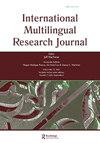Sociolinguistic context matters: Exploring differences in contextual linguistic diversity in South Africa and England
IF 2.1
1区 文学
Q2 EDUCATION & EDUCATIONAL RESEARCH
引用次数: 1
Abstract
ABSTRACT Individual reports of language history, use, and proficiency are generally considered sufficient for language profiling. Yet, these variables alone neglect the contribution of contextual linguistic diversity to one’s overall language repertoire. In this study we used the Contextual Linguistic Profile Questionnaire to evaluate whether there is a difference in contextual linguistic diversity between participants across the linguistically dissimilar contexts of South Africa and England. We further assessed whether self-reported lingualism status groups (monolinguals, bilinguals, multilinguals) scored differently on contextual linguistic diversity to evaluate the utility and uniformity of categorical labels across varying contexts, and investigated how codeswitching and socio-economic status contributed to these effects. Our results demonstrated that contextual linguistic diversity differs between nations: South Africans score higher, promotion of multilingualism is dependent on socio-economic status only in England, lingualism status is not contextually comparable when measured categorically, and codeswitching accounts for linguistic features of South Africans.社会语言学语境问题:探索南非和英国语境语言多样性的差异
语言历史、使用和熟练程度的个人报告通常被认为足以进行语言分析。然而,这些变量本身忽视了语境语言多样性对一个人整体语言库的贡献。在这项研究中,我们使用语境语言概况问卷来评估在南非和英国语言不同的语境中,参与者之间的语境语言多样性是否存在差异。我们进一步评估了自我报告的语言地位群体(单语者、双语者、多语者)是否在语境语言多样性上得分不同,以评估不同语境下分类标签的效用和统一性,并调查了代码转换和社会经济地位如何影响这些影响。我们的研究结果表明,语境语言多样性在不同国家之间存在差异:南非人得分更高,多语使用的促进仅在英国取决于社会经济地位,语言使用状况在分类测量时不具有语境可比性,代码转换说明了南非人的语言特征。
本文章由计算机程序翻译,如有差异,请以英文原文为准。
求助全文
约1分钟内获得全文
求助全文
来源期刊
CiteScore
4.10
自引率
4.80%
发文量
19
期刊介绍:
The International Multilingual Research Journal (IMRJ) invites scholarly contributions with strong interdisciplinary perspectives to understand and promote bi/multilingualism, bi/multi-literacy, and linguistic democracy. The journal’s focus is on these topics as related to languages other than English as well as dialectal variations of English. It has three thematic emphases: the intersection of language and culture, the dialectics of the local and global, and comparative models within and across contexts. IMRJ is committed to promoting equity, access, and social justice in education, and to offering accessible research and policy analyses to better inform scholars, educators, students, and policy makers. IMRJ is particularly interested in scholarship grounded in interdisciplinary frameworks that offer insights from linguistics, applied linguistics, education, globalization and immigration studies, cultural psychology, linguistic and psychological anthropology, sociolinguistics, literacy studies, post-colonial studies, critical race theory, and critical theory and pedagogy. It seeks theoretical and empirical scholarship with implications for research, policy, and practice. Submissions of research articles based on quantitative, qualitative, and mixed methods are encouraged. The journal includes book reviews and two occasional sections: Perspectives and Research Notes. Perspectives allows for informed debate and exchanges on current issues and hot topics related to bi/multilingualism, bi/multi-literacy, and linguistic democracy from research, practice, and policy perspectives. Research Notes are shorter submissions that provide updates on major research projects and trends in the field.

 求助内容:
求助内容: 应助结果提醒方式:
应助结果提醒方式:


